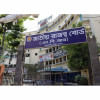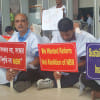Tax rates for all exporters likely to be uniform

Exporters of all sectors will likely get corporate tax rates equal to that of garment exporters from the next fiscal year, said officials of the finance ministry, which plans to encourage the diversification of Bangladesh's export basket by affording this benefit.
Woven and knitwear makers, the biggest export earners, currently face a 10 per cent tax rate for factories with green building certification and 12 per cent for other units, according to the National Board of Revenue (NBR).
Makers of jute and jute goods also have the privilege of paying 10 per cent corporate tax while textile mills pay 15 per cent tax on their income.
Other export sectors, namely leather and leather goods, agro-processing and home textiles, have to pay the regular tax rate of 30 per cent for listed companies and 22.5 for non-listed companies even though they also generate several billion dollars worth of export proceeds.
An official of the finance ministry said the government is considering bringing uniformity in tax rates of all exporters to encourage them.
"We are planning to reduce the rate following demands from businesses," he said, adding that the proposal may be included in the national budget to be placed by the finance minister by the end of next week.
The government is likely to continue the 10 per cent corporate tax for jute and jute goods exporters to boost shipment of the environment-friendly goods.
Md Saiful Islam, president of the Metropolitan Chamber of Commerce and Industry (MCCI), said Bangladesh's export basket is largely filled by garments, which accounted for up to 86 per cent of the country's total export earnings a couple of years ago.
The ratio of garment exports declined to 81 per cent in fiscal year 2020-21, when overall export earnings stood at $38.75 billion, as per data from the Export Promotion Bureau.
"We have many diversified product makers and exporters but many cannot reach the policy level as they do not have associations. If the tax rates are reduced, diversified exports will increase," Islam said, adding that the MCCI has been urging for the measure.
Khondaker Golam Moazzem, research director of the Centre for Policy Dialogue, said the government has been giving the reduced tax benefit with the objective of encouraging investments of surplus funds.
"However, we have not seen any major spike in private investment in this regard," he added.
To ensure the benefit is properly implemented, the financial reporting system should be strengthened to curb the tax avoidance tendency among local companies.
Moazzem went on to say that the tax cut might affect overall tax collection.
"The question is how far the government is prepared to handle the situation when fiscal pressure is high as the requirement for payment of subsidy bills would be high," he said.
Moazzem also raised the issue of unequal tax treatment between exporters and domestic market-oriented firms.
"Domestic market-oriented firms are major employers. So, there should be a balance in the tax rate among all," he added.

 For all latest news, follow The Daily Star's Google News channel.
For all latest news, follow The Daily Star's Google News channel. 








Comments